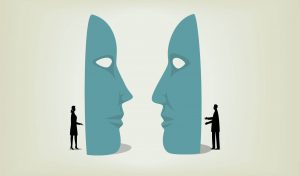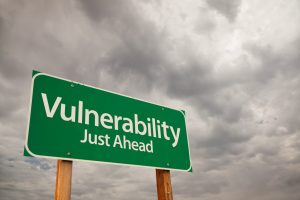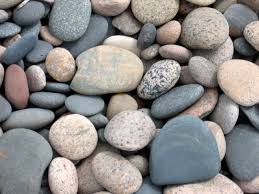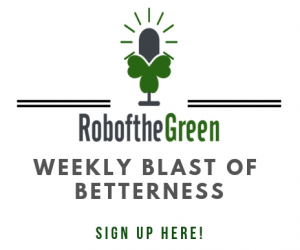Do you remember the Jennifer Lopez song from the early 00’s entitled ‘Jenny from the Block’ where said Jenny declared, possibly 100 times during the song, we’re not to ‘be fooled by the rocks (diamonds I’d imagine) that she’s got’, that she just ‘can’t forget to stay real’ and, of course, she’s still very much ‘from the Block’ (which is the Bronx in this case).
I remember at the time of hearing this all those years ago, something not sitting right. I couldn’t help feeling Jenny was very keen to tell us how real, or authentic, she remained despite all her success, fame, and diamonds. Maybe it was just me, but my
Authentometer (just made that up now btw) was not registering.
When was the last time you listened to a leader, a politician, a celebrity, or even a co-worker exclaim that they’re, like Jenny, authentic and that ‘telling it like it is’ is just how they roll?
Did you believe them? Was your gut screaming saying, ‘yeah right! you’re not fooling me’. When you hear such statements declaring just how ‘real’ people are, do you instantly feel irritated, angry, or even jealous? Do they seem to be telling you what you think they wanted you to hear?
Taking it a bit closer to home, is it something you say about how you live your own life? Are you living an authentic life or working towards that? Is it something you’re striving for but don’t know what it really means for you? Maybe this post will help.
Define it!
I always like to look at how words are defined. All too often, we skip this part and have a fuzzy idea from the outset as a result.
To be authentic is ‘of undisputed origin and not a copy; genuine.’ And as it relates to a person, ‘representing one's true nature or beliefs; true to oneself or to the person identified.’
If you’re anything like me, on a lot of occasions, when I hear declarations of authenticity, it can bring up different emotions and feelings. It’s very easy to say it, but quite difficult to buy into it, for myself or for others.

Creating the illusion of authenticity and being eager to tell others just how in touch with who you are is one thing. Actually, doing the work on yourself to discover what that truly means, figuring out who the real person behind the mask is, can be more difficult in practice.
This is a question I’ve been working on answering for myself for a long while. For most of my Twenties, and some of my Thirties, I found myself saying ‘being authentic’ was very important to me. Not only important to me, but important how others thought about me too. The persona I wanted to outwardly portray was critical. I may have even done a decent job at making others believe me. Looking back, I only had a vague sense of what it meant. My heart was in the right place, but my authenticity compass was not pointed in the right direction. After a while, this can be draining and life’s too short putting on an act. So, I decided to do the work needed on myself.
Through a combination of self-coaching and being coached by others, I’ve come to realise that the route is one that’s not still fully planned out and I’ll possibly be finding my way forever. I do believe I’ve found some fundamental markers along the way that have been key in helping me discover what my own ‘block’ looks like. Let me share these and see if they resonate with you.
1. Self-Accept
Authenticity is about allowing yourself to be witnessed—purely, and simply, as you. The first step forward was accepting who I was, instead of who I was trying to be. Only I know my own truth fully. The good, bad, and the ugly. Over the years, fighting against mistakes that I’ve made, things I’ve done, and said, and wanting them to change only made them worse.
Once I began to accept these, learn from them and improve as a result, I became more comfortable in my own skin. It’s very difficult to be authentic when you’re not a peace with your past, present, and future. Accept what is. As a colleague of mine used to say to me, ‘It is what it is’. How do you get there? I’ve found journaling helpful. Writing down my thoughts, regularly.
2. Self-Awareness & Self-Management
One morning, about 5 years ago, I remember waking up a little late for work and instantly getting myself into a panic.
As soon as that blissful second or two where your mind is empty and still just after waking up passed, the reality of the day ahead surged into my mind. Realising that I had something like 14 x 30 minute meetings scheduled for the day ahead, and a ton of other work to get done, set me into a spiral.
My mind was racing, I was stressed, and I hadn’t even got out of bed yet. I just knew something had to change. This wasn’t living an authentic life, or any type of life worth getting up for. While I was somewhat aware of what was happening, and that a change was needed, I didn’t have the tools or ability to manage it. That’s where Mindfulness came into play.
While I was aware of the reported benefits of the practice from listening to podcasts and watching YouTube videos, I just hadn’t given the regular practice a proper go. I made excuses that I was too busy! Ironic or what! I knew I needed to make a change so I committed to a daily practice, initially for a month. Getting up that 20 minutes earlier to make space for it. This was the beginning of a gradual, yet significant change. The beginning of a more self-aware me.
I’ve posted a lot about its benefits over the last couple of years (check out the blogs
here) but in short, being more mindful has been a game changer. It’s allowed me to better observe what’s going on inside (the self-awareness piece) and then gave me that space or time to make better choices on how I respond to what’s coming up (self-management). The great thing about it is I can do it anytime and anyplace. It’s always available. Once you’re breathing, which I’m assuming you still are, you can do it!
Developing a greater self-awareness has made me less impulsive, in thought and in action. Before, random thoughts could come in (like the 14 meetings in the day ahead) triggering an emotional response. I’d feel down, negative, stressed, or panic stricken. That would lead to me take actions not in-line with my values, beliefs or principles. I’d end up doing (or saying) something inauthentic. Just to say the right thing or take the easy way out.
Becoming that little bit more aware, gives me that extra moment to make a better choice, take a better option, and ensure it’s one that is part of my truth and in sync of with my values. So, commit to a Mindfulness practice a go for a period of time, not expecting immediate results. Just do it!
3. Being Vulnerable – It’s ok to not be ok!

Think of the great managers and leaders you’ve worked for in your career so far. Or ones that you’ve admired from afar. Would you say they were OK showing vulnerability? Or did it seem that they always had to be right?
In the fast paced tough talking mask filled world of Business and Leadership, showing a vulnerable side could be seen as a weakness.
While accepting yourself (in #1) takes work, taking off your mask can be tough and showing the real you to others is even more scary.
But for me, to get closer to your authentic-self, being vulnerable is key. While never easy, it can be done. For me, doing the work in both #1 and #2 above has made #3 more manageable.
If you’re in a state of acceptance of who you are and are in a good place when it comes to managing your internal emotions, then stepping outside of the mask can be possible.
Nobody has got it all figured out and being vulnerable can have a positive effect on how you’re viewed as a leader, if you’re doing it in an authentic way.
Jim Breen, a leader I admire here in Ireland, and hugely successful entrepreneur, and a guest on my
podcast last year, has been championing vulnerability for a number of years. Not just for leaders but for everyone. Saying ‘It’s ok not to feel ok, and it’s ok to ask for help’ springs to mind. Being ok to show your vulnerable side in a genuine way has an instant relaxing effect for me. It’s another key part of unmasking.
4. Do the (self) work & enjoy the process
If you’re reading this far, great. It probably means you’re committed to figuring yourself out and discovering a more real version of you! Now, while you might not agree with my first three points above, that’s ok. Your attributes, values or actions to get there may be different. But this fourth and final point, in my view, is one that’s essential for everyone.
I’m not a huge fan of clichés and try to use them sparingly. For me, figuring out my authentic self has been (and probably right to say still is) a journey. I discovered that the more work I do at getting better (in whatever area of my life I’m focused on), the more I realise that the real growth, learning and progress comes as you commit to and follow the path towards whatever that goal is.
I’ve posted about my
Dry18 journey, my
Podcasting journey, and others. It’s the same with the work done to get to a more authentic self. If you’re keen to figure out what that means to you, then you’re likely going to figure out a whole lot more along the way.
Now while that path is not likely to be linear, expect many twists and turns along the way, it’s 100% worth doing. You’re going to challenge yourself, your beliefs, and assumptions. But you’re working to answer a question that really matters and can have a significant impact on how you live your life into the future.
As you put the effort in, you’ll be exposed to new perspectives, learn new tools, develop new practices, and start to see yourself (and others) in a different light. Doesn’t that sound like a journey worth taking?
A final truth!
Before I finish, I’ll share one another truth. In the spirit of my own authenticity. When I sat down to write this, I was far from clear on what authenticity was to me. For the last few years, I’ve been undertaking all the work outlined in the 4 steps above, but not in a very focused and targeted way. I didn’t have a SMART goal stating, ‘Reach Your Authentic Self by February 2019 through practicing Steps 1,2 & 3 and enjoy the process as outlined in 4’. I knew I had a strong sense of what authenticity meant, and means, to me but hadn’t taken the time to reflect and summarise it in words. That made me a little uneasy but also excited by what I’d come up with.
This step along the process, probably not the last, has been very rewarding. I have a developed my own definition of authenticity for me. Being able to verbalise how it feels has brought it to life even more.

Maybe I was being too hard on Jenny (from the Block) after all. My approach was to write an article/blog post to figure out what it is for me, Jenny put it down in lyrics to a song. Whatever works best I guess to get you to the desired result. There are many paths that can lead you to the outcome. We just took different ones. Unlike Jenny, the only ‘rocks that I got’ are the ones in my back garden. For Real!
What does authenticity mean to you?
Are you on your own journey to dropping an inauthentic mask to be more real?
Did this post help?
Like any work worth doing, it takes time and effort. Whatever your own definition is for authenticity, I feel it's better to have one than to not.
If you’d like to chat more about how coaching could work in helping you in your search for authenticity, or other personal or professional development goals you have, get in touch. Details below.
Core Values Reminder
One of the most worthwhile pieces of work you can do on yourself is to identify your core values. Authenticity might be one of these. I posted an approach I used to identify my own and I use in coaching others. You can read that process
here.
Rob is a qualified Executive Coach (ACC with ICF) and has been Mentoring and Coaching over the last decade in various roles held during his career. In 2017, Rob launched the Rob of the Green Platform which hosts the 1% Better Podcast. Rob currently is a director of Project Management and Leadership Coaching at Dell in Cork, Ireland. Rob also publishes articles on productivity, goal setting, meditation, and other topics, like this one! Rob recently published an eBook on giving up alcohol for 2018 called ‘Dry18’ and can be downloaded for free here.
Connect in with Rob on the socials or via email on the links below:
Email Twitter Facebook Website
Subscribe to the Rob of the Green Newsletter Here


 Creating the illusion of authenticity and being eager to tell others just how in touch with who you are is one thing. Actually, doing the work on yourself to discover what that truly means, figuring out who the real person behind the mask is, can be more difficult in practice.
This is a question I’ve been working on answering for myself for a long while. For most of my Twenties, and some of my Thirties, I found myself saying ‘being authentic’ was very important to me. Not only important to me, but important how others thought about me too. The persona I wanted to outwardly portray was critical. I may have even done a decent job at making others believe me. Looking back, I only had a vague sense of what it meant. My heart was in the right place, but my authenticity compass was not pointed in the right direction. After a while, this can be draining and life’s too short putting on an act. So, I decided to do the work needed on myself.
Through a combination of self-coaching and being coached by others, I’ve come to realise that the route is one that’s not still fully planned out and I’ll possibly be finding my way forever. I do believe I’ve found some fundamental markers along the way that have been key in helping me discover what my own ‘block’ looks like. Let me share these and see if they resonate with you.
1. Self-Accept
Creating the illusion of authenticity and being eager to tell others just how in touch with who you are is one thing. Actually, doing the work on yourself to discover what that truly means, figuring out who the real person behind the mask is, can be more difficult in practice.
This is a question I’ve been working on answering for myself for a long while. For most of my Twenties, and some of my Thirties, I found myself saying ‘being authentic’ was very important to me. Not only important to me, but important how others thought about me too. The persona I wanted to outwardly portray was critical. I may have even done a decent job at making others believe me. Looking back, I only had a vague sense of what it meant. My heart was in the right place, but my authenticity compass was not pointed in the right direction. After a while, this can be draining and life’s too short putting on an act. So, I decided to do the work needed on myself.
Through a combination of self-coaching and being coached by others, I’ve come to realise that the route is one that’s not still fully planned out and I’ll possibly be finding my way forever. I do believe I’ve found some fundamental markers along the way that have been key in helping me discover what my own ‘block’ looks like. Let me share these and see if they resonate with you.
1. Self-Accept Authenticity is about allowing yourself to be witnessed—purely, and simply, as you. The first step forward was accepting who I was, instead of who I was trying to be. Only I know my own truth fully. The good, bad, and the ugly. Over the years, fighting against mistakes that I’ve made, things I’ve done, and said, and wanting them to change only made them worse.
Once I began to accept these, learn from them and improve as a result, I became more comfortable in my own skin. It’s very difficult to be authentic when you’re not a peace with your past, present, and future. Accept what is. As a colleague of mine used to say to me, ‘It is what it is’. How do you get there? I’ve found journaling helpful. Writing down my thoughts, regularly.
2. Self-Awareness & Self-Management
One morning, about 5 years ago, I remember waking up a little late for work and instantly getting myself into a panic.
Authenticity is about allowing yourself to be witnessed—purely, and simply, as you. The first step forward was accepting who I was, instead of who I was trying to be. Only I know my own truth fully. The good, bad, and the ugly. Over the years, fighting against mistakes that I’ve made, things I’ve done, and said, and wanting them to change only made them worse.
Once I began to accept these, learn from them and improve as a result, I became more comfortable in my own skin. It’s very difficult to be authentic when you’re not a peace with your past, present, and future. Accept what is. As a colleague of mine used to say to me, ‘It is what it is’. How do you get there? I’ve found journaling helpful. Writing down my thoughts, regularly.
2. Self-Awareness & Self-Management
One morning, about 5 years ago, I remember waking up a little late for work and instantly getting myself into a panic.
 Think of the great managers and leaders you’ve worked for in your career so far. Or ones that you’ve admired from afar. Would you say they were OK showing vulnerability? Or did it seem that they always had to be right?
In the fast paced tough talking mask filled world of Business and Leadership, showing a vulnerable side could be seen as a weakness.
While accepting yourself (in #1) takes work, taking off your mask can be tough and showing the real you to others is even more scary.
But for me, to get closer to your authentic-self, being vulnerable is key. While never easy, it can be done. For me, doing the work in both #1 and #2 above has made #3 more manageable.
If you’re in a state of acceptance of who you are and are in a good place when it comes to managing your internal emotions, then stepping outside of the mask can be possible.
Think of the great managers and leaders you’ve worked for in your career so far. Or ones that you’ve admired from afar. Would you say they were OK showing vulnerability? Or did it seem that they always had to be right?
In the fast paced tough talking mask filled world of Business and Leadership, showing a vulnerable side could be seen as a weakness.
While accepting yourself (in #1) takes work, taking off your mask can be tough and showing the real you to others is even more scary.
But for me, to get closer to your authentic-self, being vulnerable is key. While never easy, it can be done. For me, doing the work in both #1 and #2 above has made #3 more manageable.
If you’re in a state of acceptance of who you are and are in a good place when it comes to managing your internal emotions, then stepping outside of the mask can be possible.
 Maybe I was being too hard on Jenny (from the Block) after all. My approach was to write an article/blog post to figure out what it is for me, Jenny put it down in lyrics to a song. Whatever works best I guess to get you to the desired result. There are many paths that can lead you to the outcome. We just took different ones. Unlike Jenny, the only ‘rocks that I got’ are the ones in my back garden. For Real!
What does authenticity mean to you?
Are you on your own journey to dropping an inauthentic mask to be more real?
Did this post help?
Like any work worth doing, it takes time and effort. Whatever your own definition is for authenticity, I feel it's better to have one than to not.
If you’d like to chat more about how coaching could work in helping you in your search for authenticity, or other personal or professional development goals you have, get in touch. Details below.
Core Values Reminder
One of the most worthwhile pieces of work you can do on yourself is to identify your core values. Authenticity might be one of these. I posted an approach I used to identify my own and I use in coaching others. You can read that process here.
Maybe I was being too hard on Jenny (from the Block) after all. My approach was to write an article/blog post to figure out what it is for me, Jenny put it down in lyrics to a song. Whatever works best I guess to get you to the desired result. There are many paths that can lead you to the outcome. We just took different ones. Unlike Jenny, the only ‘rocks that I got’ are the ones in my back garden. For Real!
What does authenticity mean to you?
Are you on your own journey to dropping an inauthentic mask to be more real?
Did this post help?
Like any work worth doing, it takes time and effort. Whatever your own definition is for authenticity, I feel it's better to have one than to not.
If you’d like to chat more about how coaching could work in helping you in your search for authenticity, or other personal or professional development goals you have, get in touch. Details below.
Core Values Reminder
One of the most worthwhile pieces of work you can do on yourself is to identify your core values. Authenticity might be one of these. I posted an approach I used to identify my own and I use in coaching others. You can read that process here.
